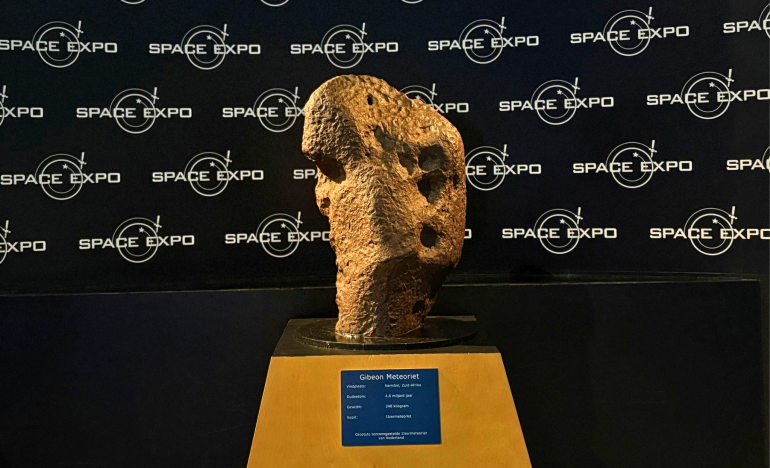Out of this world: meteorite sale expected to raise €1 million

An iron meteorite weighing 240 kilos will be auctioned off in Noorwijk at the end of August to help fund a new planetarium in Dordrecht and modernise its observatory.
The rock, which is currently on show at the Space Expo museum in Noordwijk, hit Earth near the Namibian village of Gibeon between 10,000 and 30,000 years ago.
It is one of many pieces that rained down on the earth when a much larger piece of rock broke off from an asteroid between Mars and Jupiter following a collision, fragmenting in the atmosphere.
In 1836, British captain J.E. Alexander discovered the first pieces in Namibia and took them to London. Pieces of the Gibeon meteorite then found their way across the world, and were particularly popular with people who thought the rock could improve their creativity.
The piece that is for sale originally ended up at a meteorite lab in Arizona before coming into the ownership of the Mercurius Observatory in Dordrecht in 2004.
“The impact was enormous,” spokesman Philippe Schoonejans told public broadcaster NOS. “There have been many finds, but since 2004, the export of meteorites has been banned by law. So this is the largest piece of the meteorite for sale.”
International meteorite experts helped certify the stone and Space Expo was asked to organise the auction. “That was interesting to us because we could build a programme around it. The benefits of the sale go to the Dordrecht observatory, which could do with the money,” Schoonejans said.
A 25-kilo piece of Mars auctioned by Sotheby’s fetched an unexpected €5 million, and the expectation is the iron meteorite will fetch around €1 million, Schoonejans said. “But it’s a matter of what people are prepared to give for it,” he said.
Meteorites are becoming more popular, according to auction master Bradley Hessink. It is likely a museum or collector will buy it, he said, but “it may well be a property magnate in a penthouse in New York who puts it next to his telescope,” he said.
The meteorite will be auctioned on August 30. Until then visitors are welcome to see – and touch – the rock at the Space Expo museum.
Thank you for donating to DutchNews.nl.
We could not provide the Dutch News service, and keep it free of charge, without the generous support of our readers. Your donations allow us to report on issues you tell us matter, and provide you with a summary of the most important Dutch news each day.
Make a donation